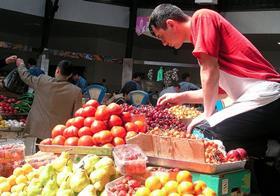
The quality of fresh fruits and vegetables in Russian stores has fallen markedly since the ban on food imports from the EU and Turkey was introduced, according to a survey from Morgan Stanley.
“We have visited a number of federal and regional retail chains to examine the quality of fruits and vegetables,” the report stated. “We recognise that this is not a representative sample. But the quality of fresh fruits and vegetables in the stores, which we have visited, has deteriorated.”
The analysts applied little blame to retailers, which have had to switch sources for a host of products, seeking out alternatives in North Africa and the Middle East.
“This means longer transportation, which often leads to lowering of the quality of fruits and vegetables, and sometimes — a rise in their prices,” the report noted.
Imported goods have seen their prices rise as a result of the devaluation of the rouble, reducing the purchasing power of Russian consumers.
“The data show that 30 per cent of respondents have started visiting supermarkets less often; one third of respondents make more purchases at open markets; more than 20 per cent have started to grow more of their own fruits and vegetables,” the report said.
Morgan Stanley’s analysts stated that the lifting of the embargo on Turkey could improve the quality of fresh fruits and vegetables in Russian stores, while reducing costs for local food retailers, but concluded that a significant slowdown in inflation was unlikely.



